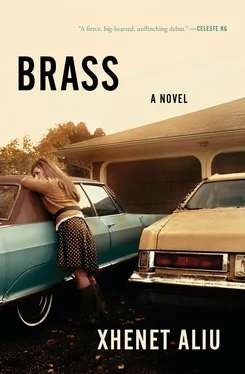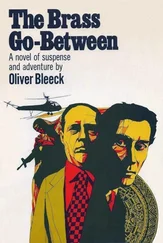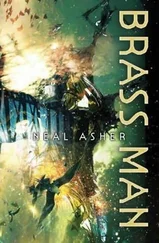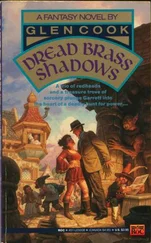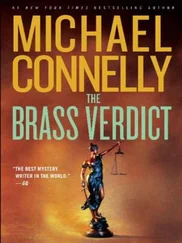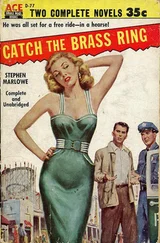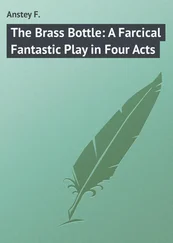It sounds good, and it briefly makes sense in your head. But then it doesn’t make sense, because how is this your beginning? The people out there are your family, kind of, but except for your mother, it feels so wrong to use that word. They aren’t your origin. This isn’t your home. You look around and none of this is familiar to you, not the pink carpet in the bathroom or the lavender-scented everything or the men’s yellow Bic classic razor with soap and dark stubble découpaged onto blades that are rusted into the same hue of sunset orange you and Ahmet had chased down I-20 only yesterday.
But wait a second.
That hair belongs to your father. You’re in his house, sitting on the same toilet on which he sits, possibly staring at the same spot of dirty caulk he stares at when wondering how he, too, had fucked things up so impossibly.
That’s it. You’ve been in his house for ten minutes now, you’ve caught the electric rabbit you’d been chasing, and yet you’ve forgotten to even conjure his name.
You flush and don’t bother to run the faucet water to pretend that you’re washing your hands. “Where’s my father?” you ask before you reach the end of the hall. “Bashkim?” you say, when you arrive back in the dining area, in case they don’t understand what you mean by father, but nobody responds, other than to glance at each other or stare at you blankly.
“Is he here? Is he mad?” you ask.
Finally Adnan shakes his head.
“He’s not mad?” you ask.
“He’s not here,” Adnan says. “He’s dead.”
“You don’t have to say it like that,” the younger boy says.
“Dead?” you repeat. “Like, dead?” you ask their mother, who responds by getting up to put water in the kettle for more tea. The little girl clings to her side, though she seems a little too old to do that kind of thing.
“She doesn’t speak English too good,” Adnan says.
“Dead,” the woman repeats anyway.
Your mother hasn’t said a word the whole time, not since you walked through the door, and you don’t know why the woman is bothering to make more tea because your mother hasn’t taken so much as a sip of hers. She’s so mad she can’t even look at you, and suddenly you’re so sorry that you can’t look away. All of this was for nothing. This intangible thing that you’ve been chasing because you decided the tangible things you started from were worthless, and this is the final nothing. All you’ve accomplished was getting two thousand miles closer to someone who would always be a million miles away.
The end.
But really?
Maybe not. What now? Do you quit, or cry, or leave, or keep running, or what? You can’t just end things by being sorry. That’s not an ending, it’s just a feeling, but it’s the one that consumes everything else.
Fuck. I’m sorry, I’m sorry, I’m sorry, you think, but you don’t have the guts to say something so puny out loud. Instead you look over at your mother and hope she sees it on you, or that she can pierce into your skull and let it out that way. You want to tattoo it across your forearm so people will know it when you wave to them in greeting: Oh, that’s the girl who’s sorry.
“I’m so, so sorry,” your mother says, and you’re shocked that it worked, that you managed to convey it strongly enough simply through breathing that she can read it off of you. Except she’s crying, and slowly you realize that she’s not translating what you’re thinking but saying what she is. You don’t understand it. Why is she crying, why is she the one saying she’s sorry, when you’re the one who fucked up her life and these people’s lives and Ahmet’s life and maybe even whatever life an already dead man had left behind? But even if you don’t understand it, you’re grateful that she’s able to say it, because it feels good to hear. It makes you think that maybe you don’t understand much of anything at all, which feels awful and a little hopeful at the same time.
The helium It’s a Girl! balloons that danced in the kitchen for days began to droop, skirting the room like trapped birds looking for the way out. There were people around constantly at first—Mamie, Yllka, Greta, Deena, Rini, Margot, Dardata, the rest of the wives whose names I still hadn’t figured out—and then, because they needed to preserve their vacation days for their vacations and their sick days for their sicknesses, they started dropping by just for a few minutes after work, and then just calling to see how we were doing, and then telling me just to call them if I needed anything. Gjonni had fixed the phone, wouldn’t let that kind of disaster happen again, though it couldn’t actually happen again, not to me, anyway. Don’t be shy, call! they said, but I didn’t call, and it wasn’t because I was shy. I was grateful and didn’t want to ask for more from them. I had to figure out how to do things for myself, and not just for myself, but for you. I needed food because you needed food, so I filled out the paperwork for WIC and vowed that your milk wouldn’t always be reconstituted nonfat powder that nobody could swallow without some added cocoa and sugar. Who’d have known that by the time I could buy us cartons of the actual stuff at Stop & Shop you wouldn’t even want milk anymore? It’s for the babies of the animals that gave birth to them, you say now. You say, That milk is not meant for me.
I gave you my milk as long as I could, but because of all of the other things you needed, eventually it had to come from somewhere else. Once I went back to work at Ferrucci you spent your days with Aunt Greta, and she gave you bottles I prepared, half asleep, while listening to Led Zeppelin on the lowest volume that still carried sound. Once Greta left for New York and my milk dried up—I wasn’t pumping enough, they said, or wasn’t hydrating enough, or was thinking too much about it, or worrying too much about everything—the ladies at the daycare fed you formula the state provided, along with the child-care vouchers that paid their salaries when the low-income mothers of Connecticut couldn’t.
How’s that line go? I have always depended on the kindness of strangers. All those kind strangers grumbling about us come payday, when a few of their cents trickled down to us by way of food stamps and Section 8 credits. I do thank them now, even when I grumble the same way when I look at my paychecks, and I have to remind myself about all those years. Funny when you have to remind yourself about things that, not long ago, consumed your every thought.
Yllka didn’t understand why I wanted to move out, especially not to the townhouse apartments the developers called a village, which everybody knew was code for “the projects.” She forbade it entirely, even stood at the bottom of the steps refusing to budge on the day that Deena’s husband came with his pickup to help move our stuff. She cried and tried to get Mamie to talk some sense into me, but Mamie just threw up her arms and said, “Do you think she’s ever listened to anything I’ve said?” I’m sure she also said something like I hope someday you have a daughter just like you, and I probably rolled my eyes about it, that oldest of curses that, it turns out, is also the only one you need to be afraid of.
Yllka was right: the apartment in their building was nicer, quieter, and free for as long as I needed it to be. Yllka and Gjonni offered that to me, but I paid them the last month’s rent by returning the crib and the changing table Bashkim had bought before he left. I could change you on a towel on the floor, and you could sleep with me until I saved up enough for something from a tag sale or a classified ad.
I never did get another crib, by the way. We shared a bed until you refused, and then you moved straight to the twin mattress you sleep on still, in the triple-decker we moved into when I no longer had to look to others to subsidize the place we call home.
Читать дальше
